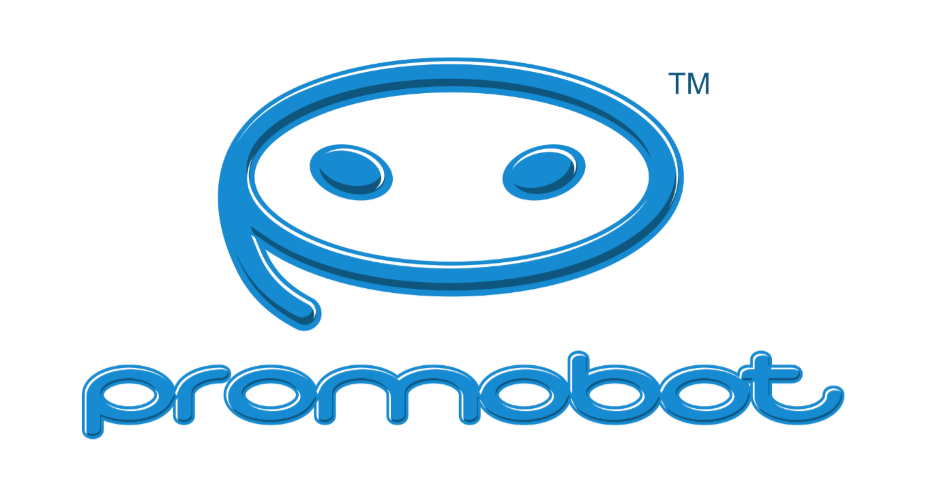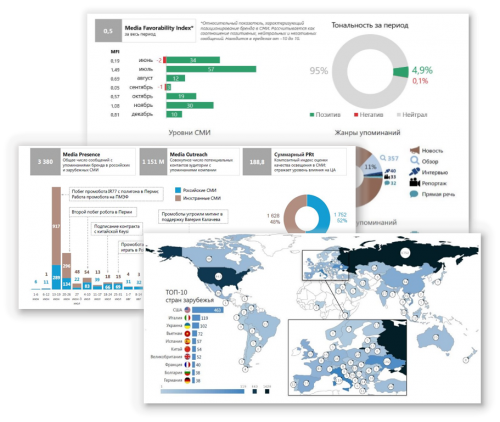
Promobot is a Perm-based hi-tech company that manufactures and sells the first absolutely autonomous service robots of original design. Established in 2013, the company performs studies under the grant support from the SKOLKOVO foundation.
Ex Libris team conducted a large-scale one-time survey into the company’s media coverage. For BOOM Communications, Promobot’s PR agency, and Ex Libris, the key task of the study was the picture of the real media effect of an unusual incident: The unplanned runaway of a Promobot robot from a test facility in Perm, Russia. The study resulted in a report with comprehensive data on media outreach, sentiment, geographical distribution of the coverage and several other metrics, including integral media activity indicators, which helped Promobot measure the effect of the event on its business.

The Promobot, an autonomous service robot, is designed to communicate and broadcast promotion materials in public places like parks, shopping malls, etc. Its originality draws the audience’s greatest attention to the robot itself as well as to products it advertises.
Promobot the company had a task to show businesses purchasing such robots in order to lease them out to advertisers that the robots Promobot manufactures are capable of communicating with people, making them smile and winning their trust in products being advertised. Such an original presentation will not leave anyone indifferent.
Promobot, the company that manufactures and sells the first absolutely autonomous service robots of original design, in summer 2016 set itself an uneasy joint task: To spread the word about Promobot products in a simple, fast, and interesting way.
The key purpose of Promobot’s PR campaign was to raise awareness about its autonomous service robots by distributing media reports shaping an image of “alive” robots with their own character in order to create them a positive image, thereby boosting sales.
1 B2B customers (companies and dealerships purchasing robots).
2 B2C customers (the mass audience, end users to engage in a direct dialogue with a robot that can recognize human speech).
The key solutions:
1. Real stories from the lab, starring a robot.
2. The scenario approach. Presenting real stories as alive and funny sketches.
3. Capitalizing on collective expectations based on science fiction.
The installation of surveillance cameras and recording all of the interesting events that occur on the test site and in the lab. As a result, a robot’s unintentional runaway was recorded, too.
Making and distributing press releases across local and regional media.
The press release on the runaway was published by local newspapers and online media as the incident was of a strictly local nature.
During the day, the news made it into the Interfax news feed, apparently for being so odd, curious, and unusual.
Then the news was covered by national mass media, and in 24 hours the runaway story reached Daily Mail via Russia Today TV channel. Later leading international media picked up the news.
1. In 2H16 (since the runaway), the number of reports mentioning the brand totaled 3,380, of which 1,628 were featured in the international and 1,752 in Russian media.
2. The aggregate potential audience contacts with the Company's mentions (Media Outreach) was 1,151,000,000 contacts (the weighted Media Outreach excluding overlap between audiences is 314 mln contacts).
3. With a small budget of the entire campaign, a thousand of favorable contacts (CPM) cost a paltry $1.59.
4. The analysis of the genre specifics of the news realm suggested that the IR77 rose to fame by mentions in sections and columns of high profile news and sensations (Oddities, Weird and Extraordinary Events, etc.) — 86% of all stories mentioning the robot. In 96% of the items the freedom-loving robot was in the center of the plot, its main character.
5. The PR campaign’s tending to the funny and positive sentiment, regardless of hi-tech specifics of the story, turned out to be efficient as 95% of news reports were neutral, 4.9% positive, and only 0.1% negative.
1. The company had new dealers in the U.K that bought five robots on the back of the Promobot's popularity with the British audience: A large consignment for the startup company because the robot price starts with RUB 500,000.
2. Monthly average orders from early 2014 (robot production start) to May 2016 (IR77 runaway date) is 3.7. The monthly average orders from June 2016 (when the runaway story became known) to mid-February 2017 is 27.77. As a result, sales jumped 7.5 times.
3. Right after the mass distribution of the runaway news, Promobot received more than 300 pre-orders to participate in the presentation of Promobot's new version, which took place in Moscow on October 26-27, 2016. The company also received great number of letters requesting "not to kill" and "not to disable" the IR77 intelligent robot for its freedom quest.
4. Thanks to the robot’s wide popularity big companies have shown their interest in the project and decided to invest in it. Those were Sberbank, VimpelCom Russia, and state-run corporations. For instance, as many as RUB150 mln were invested in the project via the Internet Initiative Development Fund (IIDF); Sberbank planned to invest the same amount.
5. The robot authors were able to meet with the local authorities and gain their support.
It became much easier for dealers and buyer companies to lease out the robots, as people recognized the robot they saw in the news.
In general, since IR77's runaway until the end of 2016, Promobot received over 150 orders for promoter robots, which enabled the startup to achieve a higher production level and begin exploring the global market. Obviously, it was IR77 recognizability among ordinary people in Russia, Europe, Southeast Asia, North and South America that encouraged most companies to turn to Promobot.
